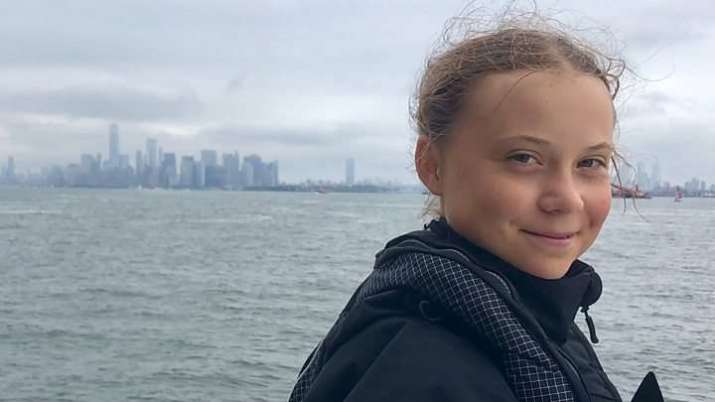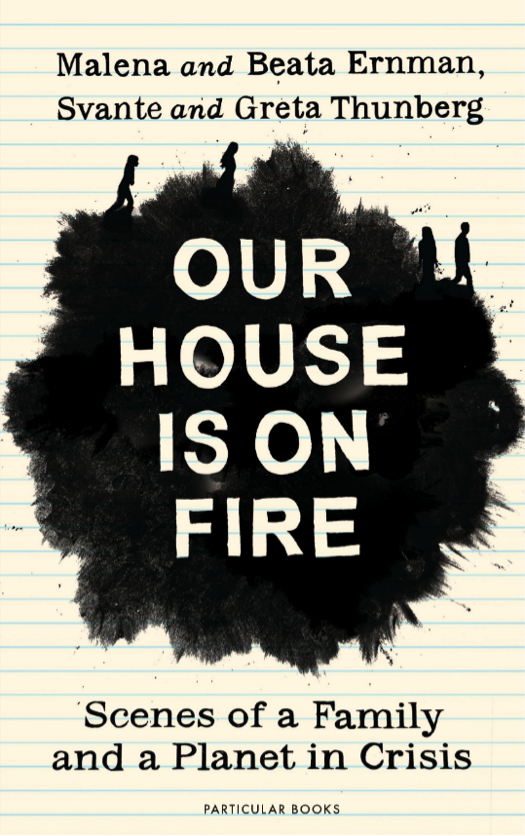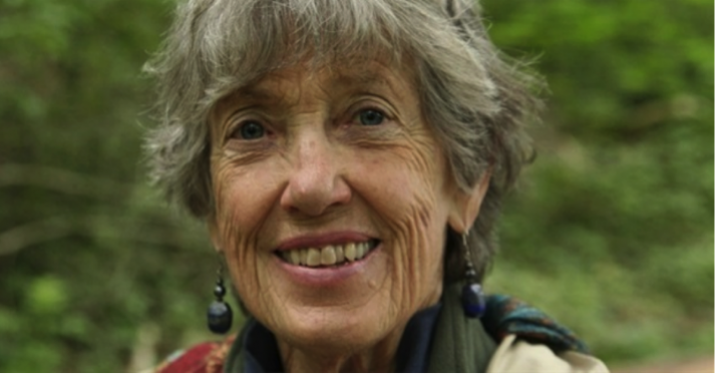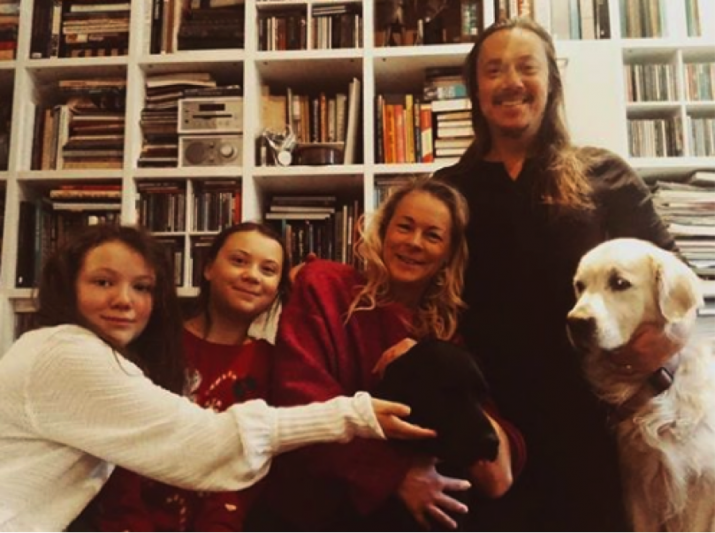FEATURES|COLUMNS|Art of Living
Pain, Purpose, and Parenting: Greta Thunberg and Joanna Macy on Personal Crises and Societal Solutions
 From bbc.co.uk
From bbc.co.ukThe family crisis that preceded Greta Thunberg’s engagement with the climate crisis holds lessons for all parents.
Raising kids is hard, but it’s nowhere near as hard as raising parents.
And this, in a way, is what Greta Thunberg has been doing on a global scale for the past couple of years. You can see it on the placards: “If you don’t act like adults, we will.” You can hear it in the speeches: “You are not mature enough to tell it like it is. Even that burden you leave to us children.”
But before her mission went global, it was very much a family affair, as her parents Malena and Svante recount in their recent memoir Scenes from the Heart, released in Sweden in 2018, and due to be released in English under the title Our House is on Fire: Scenes of a Family and a Planet in Crisis.
By now, most of us are familiar with the broad strokes of the story: after hearing about the climate crisis at the age of eight, Greta became deeply unsettled. So much so that at the age of eleven, she fell into a deep depression, and stopped talking and eating. It got so bad she lost over twenty pounds in two months and stopped going to school for almost a year. It got so bad, her parents were writing daily notes about her breakfast consumption like this: “Breakfast: 1/3 banana. Time: 53 minutes.” (GQ)
Eventually, after a visit to the children’s hospital, she was diagnosed with Asperger’s, OCD, and selective mutism. She was prescribed an anti-depressant. After that, she says, “I started to eat more and more, a slow process, but I did it. I don’t remember much from that time. I just remember it was dark.” (Dazed)
What’s less publicized is what happened within her family in the months and years prior to her entrance onto the world’s stage as an environmental activist. The more I learn about these events, the more admiration I feel not just for Greta but also for her parents. Their skillful responses to her distress didn’t just help her heal; they helped her transform her personal crisis into a global movement that finally seems to be addressing the climate crisis.
So how exactly did Greta’s parents respond? It seems to me that they did four main things.
One: they held space for her pain.
As a father of two, I know from personal experience that one of the most difficult things to do as a parent is also one of the most important: to simply hold space for our kids when they’re in pain.
In the depths of her crisis, Greta was extraordinarily distressed. In fact, her parents were so concerned that they both stopped working so they could stay home with her and help her get back on-track.
During this time, they did not of course stand idly by holding space for their daughter as she starved herself to death. When she wouldn’t eat, they pleaded, begged, cried, bribed, and threatened. When she wouldn’t listen, they took her to the hospital. When they couldn’t find the right help for her, they fought with both the health and school systems.
However, at the same time, it also seems to me they provided her with a safe container while a very painful and important process was unfolding inside her. What eventually emerged was her deep distress for the state of the planet. Perhaps she was suffering from what some psychiatrists have recently taken to calling “climate distress” or “climate grief.” (Kaiser Health News)

From particularbooks.com
Whatever the case may be, it seems clear that what she went through then is one of the things that is keeping her committed to the mission she is on now. As the Buddhist teacher and environmental activist Joanna Macy writes: “There is a journey to really getting it that our planet faces a life-threatening condition. If we haven’t fully taken in and digested the bad news of our planetary predicament, then we might see little reason to step outside the story of Business as Usual. But if the disturbing diagnosis of unraveling has really landed inside us, then we know we can’t go back to pretending that all is well.” (Macy 2012, 71)
Does this mean we parents should sit on our hands while our kids languish in clinical depressions, get lost in the maze of OCD, wither away due to eating disorders, or dwell in the silence of selective mutism? Of course not. That would be irresponsible, negligent, and even criminal. But it may be the case that it is precisely during such crises that some young people like Greta are grieving our collective losses in a way that ultimately rouses them to respond.
Two: they validated the meaning she gave to her crisis.
As Greta began to recover, she also began to give her crisis meaning by domesticating it in language and giving voice to what had rendered her speechless. As her father Svante says, as Greta emerged from her depression, “She began to express her frustration with the fact that everyone was saying one thing and doing the exact opposite all the time. Not least, us parents.” (YouTube)
Although Greta’s parents were outspoken in their concerns for human rights and the care of refugees, for example, they were completely ignorant about the sustainability crisis. This got Greta’s goat. On the one hand, there they were talking about taking care of their fellow human beings while on the other hand they were flying around the globe, eating meat and driving a gas-guzzling car. As far as she was concerned, they were the problem. And this made her upset. Very, very upset. When her mother, a famous Swedish opera singer, flew to Tokyo for a concert, Greta pointed out to her that she had just spent the equivalent of twenty West African people’s carbon budgets. (YouTube)
So Greta’s parents did something radical: they began to listen to their daughter.
This is how Greta put it: “We started talking because we had nothing else to do. […] It was good to talk. And then I kept on going, talking about [climate change] all the time and showing my parents pictures, graphs and films, articles and reports. After a while they started listening to what I actually said.” (Wired)
Rather than reducing her concerns about the climate crisis to a symptom of her personal crisis or her diagnoses, they accepted and validated the non-psychological meaning she gave to her crisis.
This, it seems, was crucial.
As Joanna Macy and many others have pointed out, “Th[e] tendency to reduce our distress about planetary conditions to some kind of psychological problem or neurosis is common. Our anguish and alarm about what we’re doing to our world are viewed as symptoms to be treated or as markers of an underlying personal issue.” (Macy, 2012, 66)
Svante and Malena didn’t invalidate their daughter’s concerns in this way. On the contrary, in Macy’s terms, they “honored her pain for the world.” (Macy, 2012, 57)
 Joanna Macy. From filmsforaction.org
Joanna Macy. From filmsforaction.orgThis is not to say that Greta or her family regard her concerns about the climate crisis as the one-and-only cause of her personal crisis. After she recovered from her depression and went back to school, she continued to be bullied and excluded by her peers. (GQ) In interviews, Greta also often says that her recovery from depression was aided by her focus on the climate, which became a path to recovery for her. But she also makes it clear that there was a very strong connection between her personal crisis and the planetary crisis.
The influential mindfulness-based psychologist Steven C. Hayes puts it this way: “Within your pain lies your purpose.” How so? Because as he also points out, “We hurt where we care and we care where we hurt.” (YouTube)
Sometimes our difficult feelings might seem like a dark box full of slithering snakes and crawling insects. But when we reach inside it, what we find there, nestled amongst the unwanted images and unpleasant sensations, is something extraordinarily precious: the gleaming gem of what matters most to us.
Three: their listening helped her transform her pain.
When she talks about opening up to her parents about the climate crisis, Greta often reiterates, “It felt good to get that off my chest.” By listening to her anguish and frustration, it seems her parents were offering her the first of many forums where her distress could be voiced, heard and valued.
This is something Joanna Macy has also noticed in the international workshops she gives: “It is our consistent experience that as people open to the flow of their emotional experience, including despair, sadness, guilt, fury or fear, they feel a weight being lifted from them” (Macy, 2012, 69-70). Why? Because, ironically, facing painful feelings can be extraordinarily enlivening. Whereas repressing emotions and information dampens our energy, going with our deep-felt responses to the world is energizing, nourishing, a release.
Macy puts it this way: “When people are able to tell the truth about what they know, see, and feel is happening to their world, a transformation occurs. There is an increased determination to act and a renewed appetite for life.” (Macy, 2012, 70)
It may also be energizing for another reason: it restores a sense of connection with others and, ultimately, with the earth itself. After all, while it may be true that inside Greta’s pain lay her purpose, there is also a sense in which neither her pain nor her purpose were hers alone. When we experience pain for the world, what if the world is actually feeling through us?
As long as we view ourselves as separate, isolated individuals, this makes no sense at all. But when we acknowledge how deeply embedded we are in a larger web of life—a web of interbeing that includes all other beings and the planet itself—we recognize that our concern for the world is actually a manifestation of our interexistence with all of life. In this way, as well as the more concrete and obvious ways, sharing our concerns with other concerned human beings connects us to them as well as to the imperiled planet that produced us all.
 The Thunberg family. From facebook.com
The Thunberg family. From facebook.comFour: they allowed themselves to be helped by their daughter and acknowledged it.
The psychologist Harold Searles has observed that many psychological crises can be traced to a disturbance of our natural desire to help others, most notably our parents. In fact, he goes so far as to argue that some of us become ill “because, and to the degree that” our attempts to help others have been thwarted, especially if those others are our parents.
This is a view that has been gaining traction in popular culture. For instance, the best-selling, Oprah-endorsed author Shefali Tsabary invites us parents to relinquish the view that our children are passive recipients of our psychological and spiritual legacies and encourages us instead to see our children as “ushers of our own development” and as “mirrors of our forgotten selves.” This is kind of obvious when you think about it. When our kids aren’t driving us bananas, it’s easy to see how they’re unwittingly nudging us to become more present, playful, firm, affectionate, generous, selfless, consistent—if, that is, we let them.
Honoring this if is, for Searles, the fix: to help our kids, according to Searles, we must first allow ourselves to be helped by them. Then we need to acknowledge this, either implicitly through our demeanor when we are interacting with them, or explicitly in a “relatively nonanxious, nonguilty and therefore nonconfessional way” as though it is “data being shared with a collaborator.”
This, it seems to me, is a pretty good description of how Greta’s parents responded to her crisis. They stopped flying; they became vegans; they installed solar panels on the roof of their family home. And, according to Greta, this was one of the key pivot-points in her transformation. As we saw, after she had shown her parents all the pictures and graphs and articles and films, she noticed that “after a while they started listening to what I actually said.” But more importantly, she emphasizes, “That’s when I kind of realised I could make a difference.” By letting her make a difference in their lives, Greta’s parents gave her the confidence that she could make a difference in other people’s lives too.
Which doesn’t mean they became permissive parents or doormats or advocates for letting kids parent their parents. Nor does it mean that they were the only ones accepting influence in the Thunberg family. Scenes From The Heart makes it clear that both Malena and Svante not only influenced but inspired many of Greta’s speeches and ideas. In fact, given their prior, outspoken commitments to human rights issues, Carl Jung’s observation doesn’t seem out of place here: “Nothing has a stronger influence psychologically on their children than the unlived life of the parent.”
But in accepting their daughter’s influence in their own lives, it does seem to me that Greta’s parents helped to unleash her influence on the entire world. Which is not to suggest that Malena and Svante are perfect parents. They aren’t. But then again, as the old saying goes, “God save the kid with perfect parents.”
Reference
Joanna Macy and Christ Johnstone. 2012. Active Hope: How to Face the Mess We’re in without Going Crazy. Novato: New World Library.
See more
Greta Thunberg: ‘To do your best is no longer good enough’ (GQ)
Meet the 16-year-old Swedish climate activist who kickstarted a global school strike movement (Dazed)
‘Climate Grief’: Fears About The Planet’s Future Weigh On Americans’ Mental Health (Kaiser Health News)
A Teen Started a Global Climate Protest. What Are You Doing? (Wired)
Greta & Svante Thunberg - Straight Talk (YouTube)
Psychological Flexibility: How love turns pain into purpose (YouTube)
Related features from BDG
Building a Climate Crisis Toolkit with Buddhist Wisdom
Related blog posts from BDG
Reflections on Greta Thunberg and Climate Change
Thich Nhat Hanh Gives Voice to New Climate Crisis Movie
Squawking about climate change
Tugging on Our Feelings about Climate Change?














